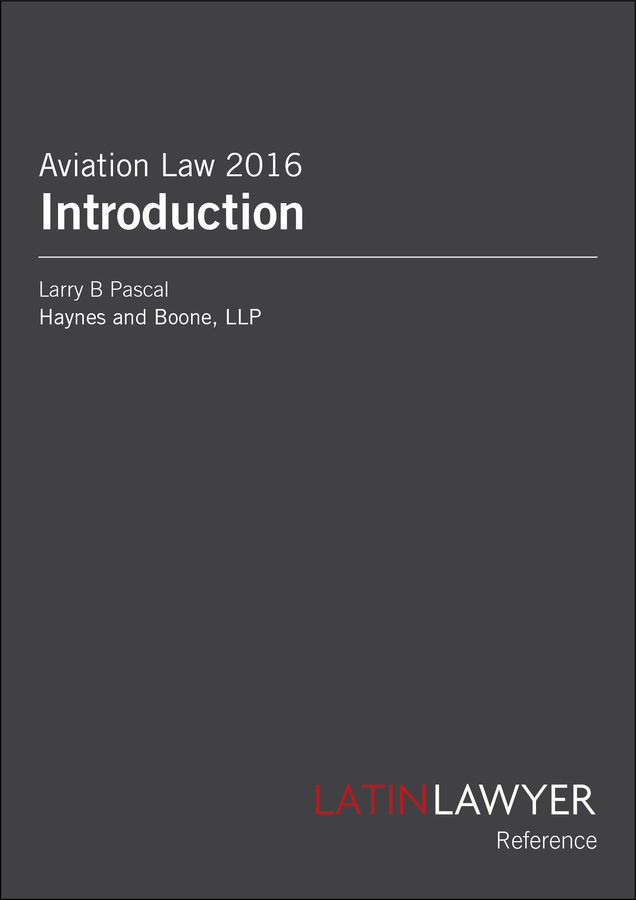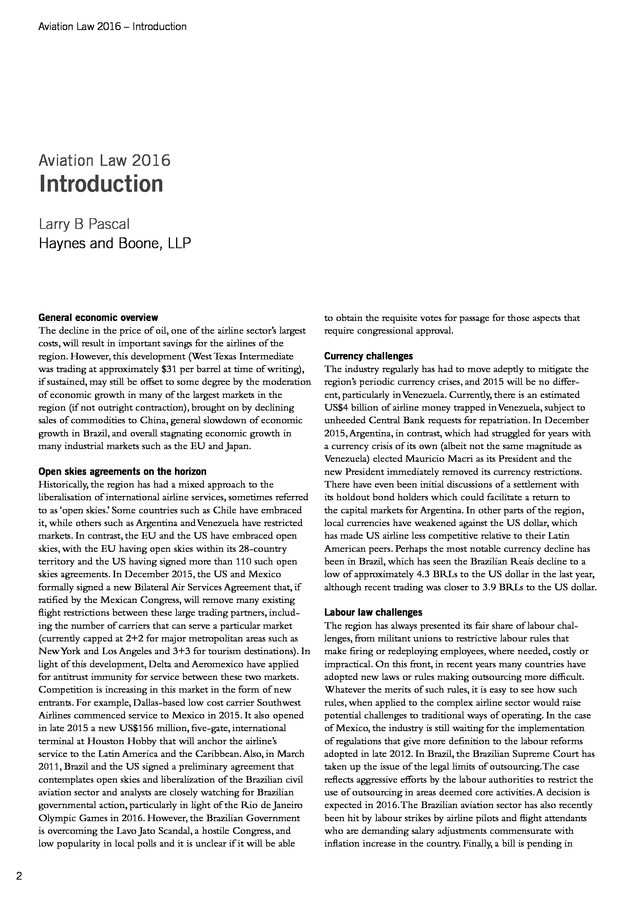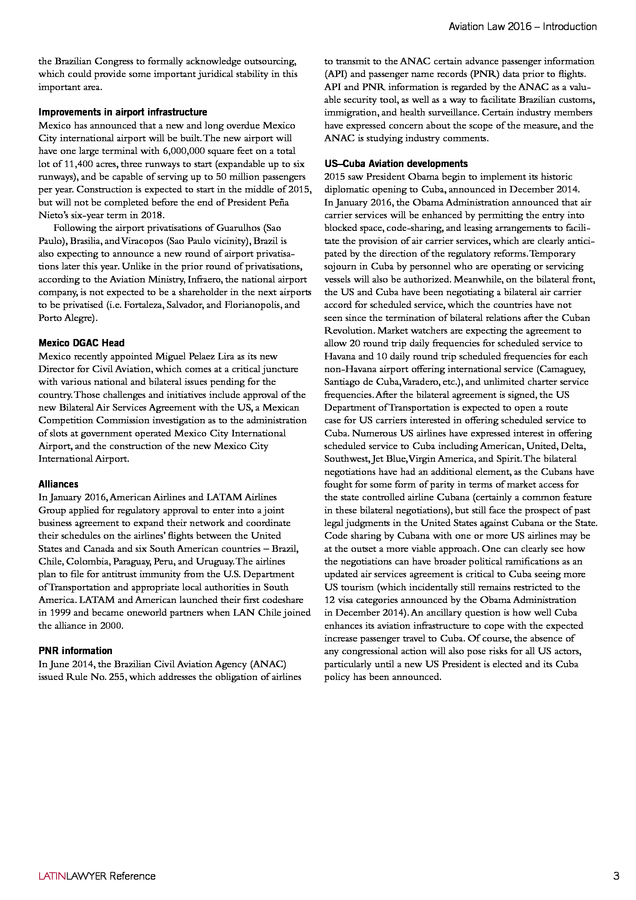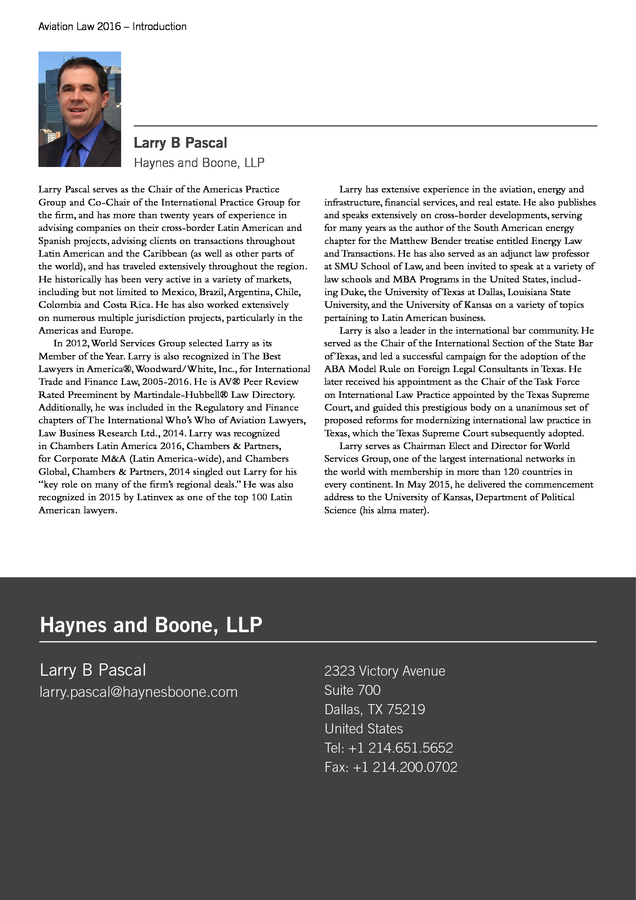Description
Aviation Law 2016
Introduction
Larry B Pascal
Haynes and Boone, LLP
LATIN LAWYER
THE BUSINESS L AW RESOURCE FOR LATIN AMERICA
Reference
. Aviation Law 2016 – Introduction
Aviation Law 2016
Introduction
Larry B Pascal
Haynes and Boone, LLP
General economic overview
The decline in the price of oil, one of the airline sector’s largest
costs, will result in important savings for the airlines of the
region. However, this development (West Texas Intermediate
was trading at approximately $31 per barrel at time of writing),
if sustained, may still be offset to some degree by the moderation
of economic growth in many of the largest markets in the
region (if not outright contraction), brought on by declining
sales of commodities to China, general slowdown of economic
growth in Brazil, and overall stagnating economic growth in
many industrial markets such as the EU and Japan.
Open skies agreements on the horizon
Historically, the region has had a mixed approach to the
liberalisation of international airline services, sometimes referred
to as ‘open skies.’ Some countries such as Chile have embraced
it, while others such as Argentina and Venezuela have restricted
markets. In contrast, the EU and the US have embraced open
skies, with the EU having open skies within its 28-country
territory and the US having signed more than 110 such open
skies agreements. In December 2015, the US and Mexico
formally signed a new Bilateral Air Services Agreement that, if
ratified by the Mexican Congress, will remove many existing
flight restrictions between these large trading partners, including the number of carriers that can serve a particular market
(currently capped at 2+2 for major metropolitan areas such as
New York and Los Angeles and 3+3 for tourism destinations).
In light of this development, Delta and Aeromexico have applied for antitrust immunity for service between these two markets. Competition is increasing in this market in the form of new entrants. For example, Dallas-based low cost carrier Southwest Airlines commenced service to Mexico in 2015. It also opened in late 2015 a new US$156 million, five-gate, international terminal at Houston Hobby that will anchor the airline’s service to the Latin America and the Caribbean.
Also, in March 2011, Brazil and the US signed a preliminary agreement that contemplates open skies and liberalization of the Brazilian civil aviation sector and analysts are closely watching for Brazilian governmental action, particularly in light of the Rio de Janeiro Olympic Games in 2016. However, the Brazilian Government is overcoming the Lavo Jato Scandal, a hostile Congress, and low popularity in local polls and it is unclear if it will be able 2 to obtain the requisite votes for passage for those aspects that require congressional approval. Currency challenges The industry regularly has had to move adeptly to mitigate the region’s periodic currency crises, and 2015 will be no different, particularly in Venezuela. Currently, there is an estimated US$4 billion of airline money trapped in Venezuela, subject to unheeded Central Bank requests for repatriation.
In December 2015, Argentina, in contrast, which had struggled for years with a currency crisis of its own (albeit not the same magnitude as Venezuela) elected Mauricio Macri as its President and the new President immediately removed its currency restrictions. There have even been initial discussions of a settlement with its holdout bond holders which could facilitate a return to the capital markets for Argentina. In other parts of the region, local currencies have weakened against the US dollar, which has made US airline less competitive relative to their Latin American peers. Perhaps the most notable currency decline has been in Brazil, which has seen the Brazilian Reais decline to a low of approximately 4.3 BRLs to the US dollar in the last year, although recent trading was closer to 3.9 BRLs to the US dollar. Labour law challenges The region has always presented its fair share of labour challenges, from militant unions to restrictive labour rules that make firing or redeploying employees, where needed, costly or impractical.
On this front, in recent years many countries have adopted new laws or rules making outsourcing more difficult. Whatever the merits of such rules, it is easy to see how such rules, when applied to the complex airline sector would raise potential challenges to traditional ways of operating. In the case of Mexico, the industry is still waiting for the implementation of regulations that give more definition to the labour reforms adopted in late 2012. In Brazil, the Brazilian Supreme Court has taken up the issue of the legal limits of outsourcing.The case reflects aggressive efforts by the labour authorities to restrict the use of outsourcing in areas deemed core activities.
A decision is expected in 2016. The Brazilian aviation sector has also recently been hit by labour strikes by airline pilots and flight attendants who are demanding salary adjustments commensurate with inflation increase in the country. Finally, a bill is pending in .
Aviation Law 2016 – Introduction the Brazilian Congress to formally acknowledge outsourcing, which could provide some important juridical stability in this important area. Improvements in airport infrastructure Mexico has announced that a new and long overdue Mexico City international airport will be built. The new airport will have one large terminal with 6,000,000 square feet on a total lot of 11,400 acres, three runways to start (expandable up to six runways), and be capable of serving up to 50 million passengers per year. Construction is expected to start in the middle of 2015, but will not be completed before the end of President Peña Nieto’s six-year term in 2018. Following the airport privatisations of Guarulhos (Sao Paulo), Brasilia, and Viracopos (Sao Paulo vicinity), Brazil is also expecting to announce a new round of airport privatisations later this year. Unlike in the prior round of privatisations, according to the Aviation Ministry, Infraero, the national airport company, is not expected to be a shareholder in the next airports to be privatised (i.e.
Fortaleza, Salvador, and Florianopolis, and Porto Alegre). Mexico DGAC Head Mexico recently appointed Miguel Pelaez Lira as its new Director for Civil Aviation, which comes at a critical juncture with various national and bilateral issues pending for the country. Those challenges and initiatives include approval of the new Bilateral Air Services Agreement with the US, a Mexican Competition Commission investigation as to the administration of slots at government operated Mexico City International Airport, and the construction of the new Mexico City International Airport. Alliances In January 2016, American Airlines and LATAM Airlines Group applied for regulatory approval to enter into a joint business agreement to expand their network and coordinate their schedules on the airlines’ flights between the United States and Canada and six South American countries – Brazil, Chile, Colombia, Paraguay, Peru, and Uruguay. The airlines plan to file for antitrust immunity from the U.S.
Department of Transportation and appropriate local authorities in South America. LATAM and American launched their first codeshare in 1999 and became oneworld partners when LAN Chile joined the alliance in 2000. PNR information In June 2014, the Brazilian Civil Aviation Agency (ANAC) issued Rule No. 255, which addresses the obligation of airlines LATINLAWYER Reference to transmit to the ANAC certain advance passenger information (API) and passenger name records (PNR) data prior to flights. API and PNR information is regarded by the ANAC as a valuable security tool, as well as a way to facilitate Brazilian customs, immigration, and health surveillance.
Certain industry members have expressed concern about the scope of the measure, and the ANAC is studying industry comments. US–Cuba Aviation developments 2015 saw President Obama begin to implement its historic diplomatic opening to Cuba, announced in December 2014. In January 2016, the Obama Administration announced that air carrier services will be enhanced by permitting the entry into blocked space, code-sharing, and leasing arrangements to facilitate the provision of air carrier services, which are clearly anticipated by the direction of the regulatory reforms. Temporary sojourn in Cuba by personnel who are operating or servicing vessels will also be authorized. Meanwhile, on the bilateral front, the US and Cuba have been negotiating a bilateral air carrier accord for scheduled service, which the countries have not seen since the termination of bilateral relations after the Cuban Revolution.
Market watchers are expecting the agreement to allow 20 round trip daily frequencies for scheduled service to Havana and 10 daily round trip scheduled frequencies for each non-Havana airport offering international service (Camaguey, Santiago de Cuba,Varadero, etc.), and unlimited charter service frequencies. After the bilateral agreement is signed, the US Department of Transportation is expected to open a route case for US carriers interested in offering scheduled service to Cuba. Numerous US airlines have expressed interest in offering scheduled service to Cuba including American, United, Delta, Southwest, Jet Blue,Virgin America, and Spirit.
The bilateral negotiations have had an additional element, as the Cubans have fought for some form of parity in terms of market access for the state controlled airline Cubana (certainly a common feature in these bilateral negotiations), but still face the prospect of past legal judgments in the United States against Cubana or the State. Code sharing by Cubana with one or more US airlines may be at the outset a more viable approach. One can clearly see how the negotiations can have broader political ramifications as an updated air services agreement is critical to Cuba seeing more US tourism (which incidentally still remains restricted to the 12 visa categories announced by the Obama Administration in December 2014). An ancillary question is how well Cuba enhances its aviation infrastructure to cope with the expected increase passenger travel to Cuba.
Of course, the absence of any congressional action will also pose risks for all US actors, particularly until a new US President is elected and its Cuba policy has been announced. 3 . Aviation Law 2016 – Introduction Larry B Pascal Haynes and Boone, LLP Larry Pascal serves as the Chair of the Americas Practice Group and Co-Chair of the International Practice Group for the firm, and has more than twenty years of experience in advising companies on their cross-border Latin American and Spanish projects, advising clients on transactions throughout Latin American and the Caribbean (as well as other parts of the world), and has traveled extensively throughout the region. He historically has been very active in a variety of markets, including but not limited to Mexico, Brazil, Argentina, Chile, Colombia and Costa Rica. He has also worked extensively on numerous multiple jurisdiction projects, particularly in the Americas and Europe. In 2012, World Services Group selected Larry as its Member of the Year. Larry is also recognized in The Best Lawyers in America®, Woodward/White, Inc., for International Trade and Finance Law, 2005-2016. He is AV® Peer Review Rated Preeminent by Martindale-Hubbell® Law Directory. Additionally, he was included in the Regulatory and Finance chapters of The International Who’s Who of Aviation Lawyers, Law Business Research Ltd., 2014.
Larry was recognized in Chambers Latin America 2016, Chambers & Partners, for Corporate M&A (Latin America-wide), and Chambers Global, Chambers & Partners, 2014 singled out Larry for his “key role on many of the firm’s regional deals.” He was also recognized in 2015 by Latinvex as one of the top 100 Latin American lawyers. Larry has extensive experience in the aviation, energy and infrastructure, financial services, and real estate. He also publishes and speaks extensively on cross-border developments, serving for many years as the author of the South American energy chapter for the Matthew Bender treatise entitled Energy Law and Transactions. He has also served as an adjunct law professor at SMU School of Law, and been invited to speak at a variety of law schools and MBA Programs in the United States, including Duke, the University of Texas at Dallas, Louisiana State University, and the University of Kansas on a variety of topics pertaining to Latin American business. Larry is also a leader in the international bar community.
He served as the Chair of the International Section of the State Bar of Texas, and led a successful campaign for the adoption of the ABA Model Rule on Foreign Legal Consultants in Texas. He later received his appointment as the Chair of the Task Force on International Law Practice appointed by the Texas Supreme Court, and guided this prestigious body on a unanimous set of proposed reforms for modernizing international law practice in Texas, which the Texas Supreme Court subsequently adopted. Larry serves as Chairman Elect and Director for World Services Group, one of the largest international networks in the world with membership in more than 120 countries in every continent. In May 2015, he delivered the commencement address to the University of Kansas, Department of Political Science (his alma mater). Haynes and Boone, LLP Larry B Pascal larry.pascal@haynesboone.com 4 2323 Victory Avenue Suite 700 Dallas, TX 75219 United States Tel: +1 214.651.5652 Fax: +1 214.200.0702 .
In light of this development, Delta and Aeromexico have applied for antitrust immunity for service between these two markets. Competition is increasing in this market in the form of new entrants. For example, Dallas-based low cost carrier Southwest Airlines commenced service to Mexico in 2015. It also opened in late 2015 a new US$156 million, five-gate, international terminal at Houston Hobby that will anchor the airline’s service to the Latin America and the Caribbean.
Also, in March 2011, Brazil and the US signed a preliminary agreement that contemplates open skies and liberalization of the Brazilian civil aviation sector and analysts are closely watching for Brazilian governmental action, particularly in light of the Rio de Janeiro Olympic Games in 2016. However, the Brazilian Government is overcoming the Lavo Jato Scandal, a hostile Congress, and low popularity in local polls and it is unclear if it will be able 2 to obtain the requisite votes for passage for those aspects that require congressional approval. Currency challenges The industry regularly has had to move adeptly to mitigate the region’s periodic currency crises, and 2015 will be no different, particularly in Venezuela. Currently, there is an estimated US$4 billion of airline money trapped in Venezuela, subject to unheeded Central Bank requests for repatriation.
In December 2015, Argentina, in contrast, which had struggled for years with a currency crisis of its own (albeit not the same magnitude as Venezuela) elected Mauricio Macri as its President and the new President immediately removed its currency restrictions. There have even been initial discussions of a settlement with its holdout bond holders which could facilitate a return to the capital markets for Argentina. In other parts of the region, local currencies have weakened against the US dollar, which has made US airline less competitive relative to their Latin American peers. Perhaps the most notable currency decline has been in Brazil, which has seen the Brazilian Reais decline to a low of approximately 4.3 BRLs to the US dollar in the last year, although recent trading was closer to 3.9 BRLs to the US dollar. Labour law challenges The region has always presented its fair share of labour challenges, from militant unions to restrictive labour rules that make firing or redeploying employees, where needed, costly or impractical.
On this front, in recent years many countries have adopted new laws or rules making outsourcing more difficult. Whatever the merits of such rules, it is easy to see how such rules, when applied to the complex airline sector would raise potential challenges to traditional ways of operating. In the case of Mexico, the industry is still waiting for the implementation of regulations that give more definition to the labour reforms adopted in late 2012. In Brazil, the Brazilian Supreme Court has taken up the issue of the legal limits of outsourcing.The case reflects aggressive efforts by the labour authorities to restrict the use of outsourcing in areas deemed core activities.
A decision is expected in 2016. The Brazilian aviation sector has also recently been hit by labour strikes by airline pilots and flight attendants who are demanding salary adjustments commensurate with inflation increase in the country. Finally, a bill is pending in .
Aviation Law 2016 – Introduction the Brazilian Congress to formally acknowledge outsourcing, which could provide some important juridical stability in this important area. Improvements in airport infrastructure Mexico has announced that a new and long overdue Mexico City international airport will be built. The new airport will have one large terminal with 6,000,000 square feet on a total lot of 11,400 acres, three runways to start (expandable up to six runways), and be capable of serving up to 50 million passengers per year. Construction is expected to start in the middle of 2015, but will not be completed before the end of President Peña Nieto’s six-year term in 2018. Following the airport privatisations of Guarulhos (Sao Paulo), Brasilia, and Viracopos (Sao Paulo vicinity), Brazil is also expecting to announce a new round of airport privatisations later this year. Unlike in the prior round of privatisations, according to the Aviation Ministry, Infraero, the national airport company, is not expected to be a shareholder in the next airports to be privatised (i.e.
Fortaleza, Salvador, and Florianopolis, and Porto Alegre). Mexico DGAC Head Mexico recently appointed Miguel Pelaez Lira as its new Director for Civil Aviation, which comes at a critical juncture with various national and bilateral issues pending for the country. Those challenges and initiatives include approval of the new Bilateral Air Services Agreement with the US, a Mexican Competition Commission investigation as to the administration of slots at government operated Mexico City International Airport, and the construction of the new Mexico City International Airport. Alliances In January 2016, American Airlines and LATAM Airlines Group applied for regulatory approval to enter into a joint business agreement to expand their network and coordinate their schedules on the airlines’ flights between the United States and Canada and six South American countries – Brazil, Chile, Colombia, Paraguay, Peru, and Uruguay. The airlines plan to file for antitrust immunity from the U.S.
Department of Transportation and appropriate local authorities in South America. LATAM and American launched their first codeshare in 1999 and became oneworld partners when LAN Chile joined the alliance in 2000. PNR information In June 2014, the Brazilian Civil Aviation Agency (ANAC) issued Rule No. 255, which addresses the obligation of airlines LATINLAWYER Reference to transmit to the ANAC certain advance passenger information (API) and passenger name records (PNR) data prior to flights. API and PNR information is regarded by the ANAC as a valuable security tool, as well as a way to facilitate Brazilian customs, immigration, and health surveillance.
Certain industry members have expressed concern about the scope of the measure, and the ANAC is studying industry comments. US–Cuba Aviation developments 2015 saw President Obama begin to implement its historic diplomatic opening to Cuba, announced in December 2014. In January 2016, the Obama Administration announced that air carrier services will be enhanced by permitting the entry into blocked space, code-sharing, and leasing arrangements to facilitate the provision of air carrier services, which are clearly anticipated by the direction of the regulatory reforms. Temporary sojourn in Cuba by personnel who are operating or servicing vessels will also be authorized. Meanwhile, on the bilateral front, the US and Cuba have been negotiating a bilateral air carrier accord for scheduled service, which the countries have not seen since the termination of bilateral relations after the Cuban Revolution.
Market watchers are expecting the agreement to allow 20 round trip daily frequencies for scheduled service to Havana and 10 daily round trip scheduled frequencies for each non-Havana airport offering international service (Camaguey, Santiago de Cuba,Varadero, etc.), and unlimited charter service frequencies. After the bilateral agreement is signed, the US Department of Transportation is expected to open a route case for US carriers interested in offering scheduled service to Cuba. Numerous US airlines have expressed interest in offering scheduled service to Cuba including American, United, Delta, Southwest, Jet Blue,Virgin America, and Spirit.
The bilateral negotiations have had an additional element, as the Cubans have fought for some form of parity in terms of market access for the state controlled airline Cubana (certainly a common feature in these bilateral negotiations), but still face the prospect of past legal judgments in the United States against Cubana or the State. Code sharing by Cubana with one or more US airlines may be at the outset a more viable approach. One can clearly see how the negotiations can have broader political ramifications as an updated air services agreement is critical to Cuba seeing more US tourism (which incidentally still remains restricted to the 12 visa categories announced by the Obama Administration in December 2014). An ancillary question is how well Cuba enhances its aviation infrastructure to cope with the expected increase passenger travel to Cuba.
Of course, the absence of any congressional action will also pose risks for all US actors, particularly until a new US President is elected and its Cuba policy has been announced. 3 . Aviation Law 2016 – Introduction Larry B Pascal Haynes and Boone, LLP Larry Pascal serves as the Chair of the Americas Practice Group and Co-Chair of the International Practice Group for the firm, and has more than twenty years of experience in advising companies on their cross-border Latin American and Spanish projects, advising clients on transactions throughout Latin American and the Caribbean (as well as other parts of the world), and has traveled extensively throughout the region. He historically has been very active in a variety of markets, including but not limited to Mexico, Brazil, Argentina, Chile, Colombia and Costa Rica. He has also worked extensively on numerous multiple jurisdiction projects, particularly in the Americas and Europe. In 2012, World Services Group selected Larry as its Member of the Year. Larry is also recognized in The Best Lawyers in America®, Woodward/White, Inc., for International Trade and Finance Law, 2005-2016. He is AV® Peer Review Rated Preeminent by Martindale-Hubbell® Law Directory. Additionally, he was included in the Regulatory and Finance chapters of The International Who’s Who of Aviation Lawyers, Law Business Research Ltd., 2014.
Larry was recognized in Chambers Latin America 2016, Chambers & Partners, for Corporate M&A (Latin America-wide), and Chambers Global, Chambers & Partners, 2014 singled out Larry for his “key role on many of the firm’s regional deals.” He was also recognized in 2015 by Latinvex as one of the top 100 Latin American lawyers. Larry has extensive experience in the aviation, energy and infrastructure, financial services, and real estate. He also publishes and speaks extensively on cross-border developments, serving for many years as the author of the South American energy chapter for the Matthew Bender treatise entitled Energy Law and Transactions. He has also served as an adjunct law professor at SMU School of Law, and been invited to speak at a variety of law schools and MBA Programs in the United States, including Duke, the University of Texas at Dallas, Louisiana State University, and the University of Kansas on a variety of topics pertaining to Latin American business. Larry is also a leader in the international bar community.
He served as the Chair of the International Section of the State Bar of Texas, and led a successful campaign for the adoption of the ABA Model Rule on Foreign Legal Consultants in Texas. He later received his appointment as the Chair of the Task Force on International Law Practice appointed by the Texas Supreme Court, and guided this prestigious body on a unanimous set of proposed reforms for modernizing international law practice in Texas, which the Texas Supreme Court subsequently adopted. Larry serves as Chairman Elect and Director for World Services Group, one of the largest international networks in the world with membership in more than 120 countries in every continent. In May 2015, he delivered the commencement address to the University of Kansas, Department of Political Science (his alma mater). Haynes and Boone, LLP Larry B Pascal larry.pascal@haynesboone.com 4 2323 Victory Avenue Suite 700 Dallas, TX 75219 United States Tel: +1 214.651.5652 Fax: +1 214.200.0702 .

















